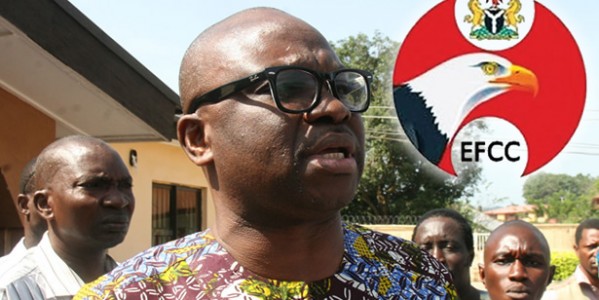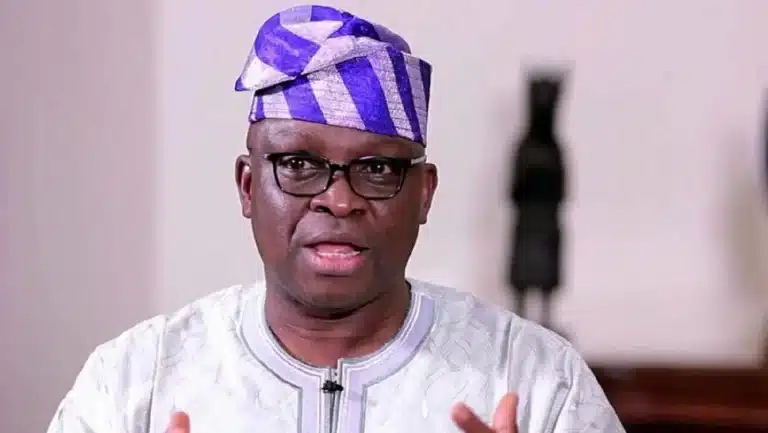Court reserves ruling on Fayose's no-case submission in N6.9bn fraud trial
Justice Chukwujekwu Aneke of the Federal High Court in Lagos has reserved ruling on the no-case submission filed by former Ekiti State Governor, Ayodele Fayose, in his trial over alleged money laundering and theft amounting to N6.9 billion.
The judge reserved his decision after hearing arguments from Kanu Agabi (SAN), counsel to Fayose (1st defendant); Olalekan Ojo (SAN), representing the 2nd defendant (Spotless Investment Limited) and Rotimi Jacobs (SAN), counsel to the Economic and Financial Crimes Commission (EFCC).
Fayose and his company were re-arraigned by EFCC on 11 counts bordering on money laundering and theft. The alleged offences reportedly took place during Fayose’s tenure as governor and involved funds allegedly linked to the office of the former National Security Adviser (NSA).
Agabi, adopting his client’s no-case submission, argued that the prosecution failed to establish a prima facie case.
He noted that Abiodun Agbele, who was allegedly involved in the offences, was not jointly tried, weakening the prosecution’s case.
“With due respect, the predicate offences on which these charges are based do not hold water. Criminal breach of trust and conspiracy are distinct, and no co-conspirator was charged alongside the defendant,” Agabi submitted.
He urged the court to hold that Fayose has no case to answer.
Similarly, Ojo adopted a no-case submission dated March 21, 2025, and supporting documents filed on May 16.
He argued that key prosecution evidence was discredited, particularly that of the 13th prosecution witness, former Minister of State for Defence, Sen Musiliu Obanikoro, who testified that there was no communication between Fayose and then NSA, Col Sambo Dasuki.
In response, the EFCC counsel urged the court to dismiss the no-case submissions. He adopted the prosecution’s counter-affidavit and written address dated May 8, 2025, arguing that the defence failed to explain the suspicious transactions.
Jacobs questioned why Fayose would not offer his account for transfers if the funds from the NSA were legitimate. He recalled testimony from EFCC investigator, Abubakar Madaki, who told the court that Fayose used associates to acquire multiple properties in Abuja, Lagos and abroad: individuals who later denied ownership, while Fayose claimed them in his statement.
“If the money was clean, why not buy the properties in his name?” Jacobs asked.
After the submissions, Agabi sought and obtained leave for Fayose to travel abroad for medical treatment.
Aneke adjourned the case till July 10, 2025, for ruling on the no-case submission.
Fayose was initially arraigned in 2018 before Justice Mojisola Olatoregun, but the EFCC later secured a transfer of the case to Aneke.
Recommended Articles
Alleged N6.9bn Fraud: Fayose argues No-Case Submission, ruling fixed for July 10

Justice Chukwujekwu Aneke of the Federal High Court in Lagos has fixed July 10, 2025, to deliver a ruling on the no-case...
Fayose Files No-Case Submission Over ₦6.9 Billion Fraud Charges

A former Governor of Ekiti State, Ayodele Fayose, has filed a no-case submission in response to the ₦6.9 billion fraud c...
N6.9bn fraud: I've no case to answer, Fayose tells court

Former Ekiti State Governor, Ayodele Fayose, has filed a no-case submission in response to the N6.9bn fraud charges brou...
Ekiti 2026: Fayose, Bamidele, others endorse Oyebanji's re-election bid

The Nation Newspaper Ekiti 2026: Fayose, Bamidele, others endorse Oyebanji's re-election bid
N6.9b fraud: Court acquits, discharges Fayose of money laundering

Justice Chukwujekwu Aneke of the Federal High Court sitting in Lagos, yesterday, upheld the no-case submission filed by ...
You may also like...
1986 Cameroonian Disaster : The Deadly Cloud that Killed Thousands Overnight

Like a thief in the night, a silent cloud rose from Lake Nyos in Cameroon, and stole nearly two thousand souls without a...
Beyond Fast Fashion: How Africa’s Designers Are Weaving a Sustainable and Culturally Rich Future for

Forget fast fashion. Discover how African designers are leading a global revolution, using traditional textiles & innov...
The Secret Congolese Mine That Shaped The Atomic Bomb

The Secret Congolese Mine That Shaped The Atomic Bomb.
TOURISM IS EXPLORING, NOT CELEBRATING, LOCAL CULTURE.

Tourism sells cultural connection, but too often delivers erasure, exploitation, and staged authenticity. From safari pa...
Crypto or Nothing: How African Youth Are Betting on Digital Coins to Escape Broken Systems

Amid inflation and broken systems, African youth are turning to crypto as survival, protest, and empowerment. Is it the ...
We Want Privacy, Yet We Overshare: The Social Media Dilemma

We claim to value privacy, yet we constantly overshare on social media for likes and validation. Learn about the contrad...
Is It Still Village People or Just Poor Planning?

In many African societies, failure is often blamed on “village people” and spiritual forces — but could poor planning, w...
The Digital Financial Panopticon: How Fintech's Convenience Is Hiding a Data Privacy Reckoning

Fintech promised convenience. But are we trading our financial privacy for it? Uncover how algorithms are watching and p...